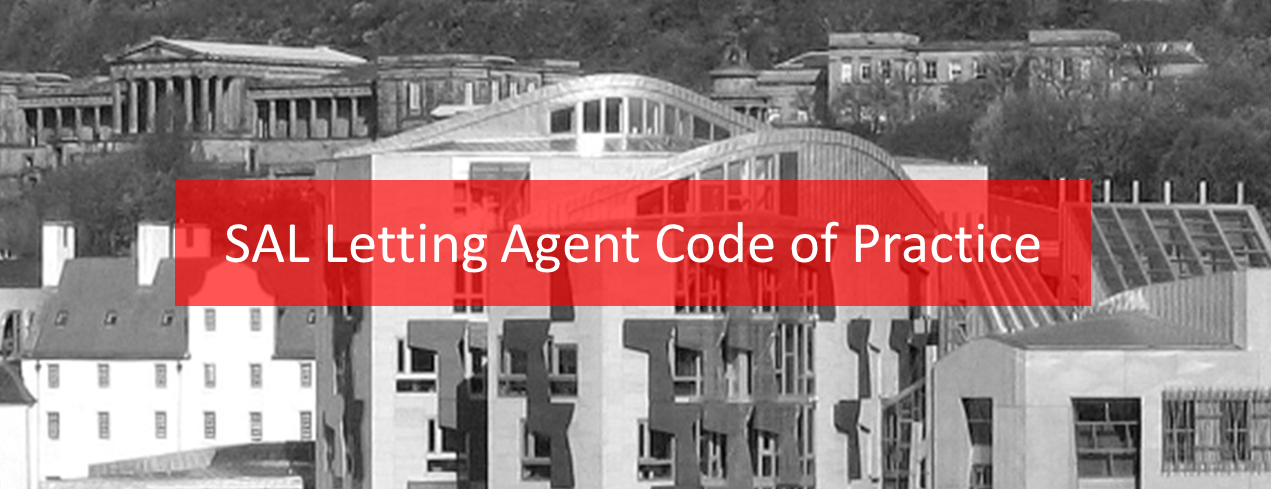
SAL Landlord Code of Practice
This Code of Practice is intended to apply to member landlords managing residential properties for let. Whilst this Code intends to promote good management standards in the private rented sector, members are reminded that landlords renting residential property are also obliged to abide by statutory duties as outlined in relevant Housing, Fire Safety, Health & Safety and Data Protection legislation. This code should not be construed as intent to replace any statutory obligations on landlords. This code does not apply to any short term lets operated by members.
1. All tenants will be provided with a written tenancy agreement or a written statement of the terms of their occupancy at the commencement of the tenancy. This will include a contact name, address and telephone number of the landlord for the provision of serving notices and ease of communication.
2. The landlord will acknowledge promptly all communications received from the tenant and make clear their procedure for dealing with tenant complaints.
3. All disrepair in the property for which the landlord is responsible will be attended to promptly, with minimum disturbance to the tenant.
4. The landlord will respect the tenant’s right to peaceful and quiet enjoyment of the property free from harassment and threat of illegal eviction.
5. The landlord will, in except of cases of emergency, give the tenant reasonable notice of not less than 24 hours in writing or 48 hours for Private Residential Tenancies (unless otherwise agreed with the tenant) when access to the property is required by the landlord or their agents.
6. The landlord will give such reasonable assistance as is required by a local authority to enable a tenant to claim housing benefit.
7. The landlord will supply the tenant with a telephone number or other means of contacting the landlord or their agent in an emergency; in particular when the landlord is absent.
8. Before proceedings are commenced, the tenant will be notified of any breach of the tenancy agreement that is to be used as a basis for legal proceedings against the tenant.
9. The landlord undertakes to explore appropriate routes to resolve disputes with the tenant by informal means before turning to formal legal proceedings.
10. The landlord will provide the tenant with accommodation (including fixtures, fittings and furnishings) that complies with all legal requirements relating to the fitness of accommodation.
11. The landlord will, when so requested, provide the tenant with a written statement of their tenancy account.
12. Where tenants pay rent weekly a rent book will be provided by the landlord. Otherwise a proper receipt will be issued whenever rent is paid direct to the landlord by cheque or cash.
13. All tenants will be treated with appropriate courtesy and respect. The landlord will always act in a fair, honest and reasonable way in all their dealings with the tenant.
14. The landlord will not refuse a tenant a reference for the purpose of securing a new tenancy, without good cause.
15. At all times the landlord will keep information about tenants confidential and only disclose such information if full consent of disclosure is obtained from the tenant.
16. Where appropriate, the landlord will obtain relevant registration under the Data Protection Act.
17. The landlord will apply for, and obtain, relevant licences and be registered with the appropriate local authority to operate as a private residential landlord in Scotland.
18. All members who operate under contract from a statutory body to provide accommodation and intend to remove tenants/occupants from properties in the event that they fail to leave are required to obtain vacant possession of properties by an order of court.
Download the pdf version here

Letting Agent Code of Practice
Letting Agent standards
In signing up to be a member of the Scottish Association of Landlords (SAL) and on annual membership renewal, all SAL letting agents members agree to abide by all legal requirements for letting in Scotland. SAL letting agent members must be registered letting agents and comply with the Letting Agent Code of Practice.
All members who operate under contract from a statutory body to provide accommodation and intend to remove tenants/occupants from properties in the event that they fail to leave are required to obtain vacant procession of properties by an order of court.
